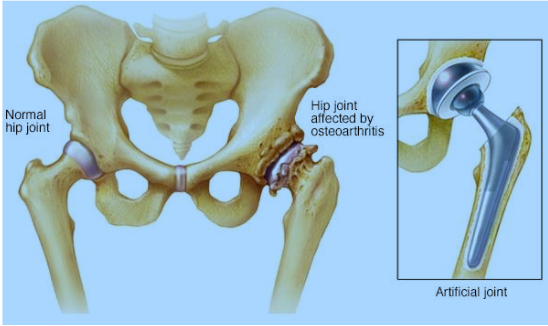Hip Replacement Surgery
(Hip Arthroplasty and Total Hip Replacement)
Hip replacement surgery (HRS) is one of most common joint replacement procedures. The surgeon removes the damaged sections of the hip joint and uses an artificial joint (prosthesis usually by ZIMMER BIOMET – FDA approved – constructed of metal, ceramic and very hard plastic) to replace them, reducing pain and improving patients functionality.
Some conditions justify a HRS, Arthritis damage (the wearing away of the normally smooth cartilage until bare bone is exposed) is the most common reason, however there are some other indications for a HRS that represent damage the hip joint, including:
- Osteoarthritis
- Rheumatoid arthritis
- Osteonecrosis
- If your hip pain interferes with daily activities and more-conservative treatments haven’t helped or are no longer effective
Consider a hip replacement if you:
- Persist with hip pain, despite pain medication
- Hip pain interferes with your daily activities
- Losing your ability to go up or down stairs because of pain
- Pain makes it difficult to rise from a seated position
- Hip pain that continues while resting, either day or night
- Stiffness in a hip that limits the ability to move or lift the leg
Usually the suggested time of stay in Costa Rica for this kind of procedure is 10 days at least -one pre-surgery day, the day of surgery, one day of post-surgery recovery in hospital and 7 days in a recovery center for the recovery period before your post-surgical evaluation.
How you prepare
Before surgery you’ll meet with your surgeon for an examination. The orthopedist will:
Complete your medical chart (medical history and current medications) Do a physical examination (examine your hip, range of motion, etc) Evaluate your studies (blood tests, an X-ray, ultrasound, MRI, others)
Define surgical condition and program surgery.
Preoperative evaluation is a good opportunity to ask questions about the procedure. Be sure to find out which medications you should avoid or continue to take in the week before surgery. Patients with chronic medical conditions (DM, HBP, heart disease) may also be evaluated by a specialist, such a cardiologist, before the surgery.
Basic Presurgical Tests
- Complete blood count
- Coagulation test
- Blood group and Rh test
- Kidney function test
- EKG
- Chest x-ray
Surgery Description
You will most likely be admitted to the hospital on the day of your surgery. After admission, you will be evaluated by a member of the anesthesia team, with your input, will determine which type of anesthesia will be best for you.
To perform a hip replacement, your surgeon:
- Makes an incision over the front or side of your hip, through the layers of tissue
- Removes diseased and damaged bone and cartilage, leaving healthy bone intact
- The damaged femoral head is removed and replaced with a metal stem that is placed into the hollow center of the femur. The femoral stem may be either cemented or “press fit” into the bone.
- A metal or ceramic ball is placed on the upper part of the stem. This ball replaces the damaged femoral head that was removed.
- The damaged cartilage surface of the socket (acetabulum) is removed and replaced with a metal socket. Screws or cement are sometimes used to hold the socket in place.
- Your surgeon will choose the type of prosthesis that best meets your needs.
- A plastic, ceramic, or metal spacer is inserted between the new ball and the socket to allow for a smooth gliding surface.
- X-rays will ensure the proper position of the hip replacement. Techniques for hip replacement might vary depending on the patient findings during your procedure. Your surgeons will perform the less invasive surgical technique to reduce recovery time and pain. After surgery, you will be moved to the recovery room where you will remain for several hours while your recovery from anesthesia is monitored. After you wake up, you will be taken to your hospital room.
Possible Complications of Surgery
HRS has a very low risk of complication (less than 2% of cases), however, chronic illnesses may increase the potential for complications. If complications occur, they are usually minor and are treated easily.
Possible postoperative problems include:
- Infection
- Blood clots
- Hip stiffness
- Accumulation of blood in the lower extremity
- Hip dislocation
- Leg Length Difference
- Hip Implant rejection It is important to note that although the risk of complications of HRS is minimal, there is a small possibility of typical complications of surgery, which include excessive bleeding during the procedure, breathing difficulties caused by anesthesia, allergic reactions or local infections.
Article provided by Dr Oscar Oeding – orthopedic surgeon in Costa Rica


















